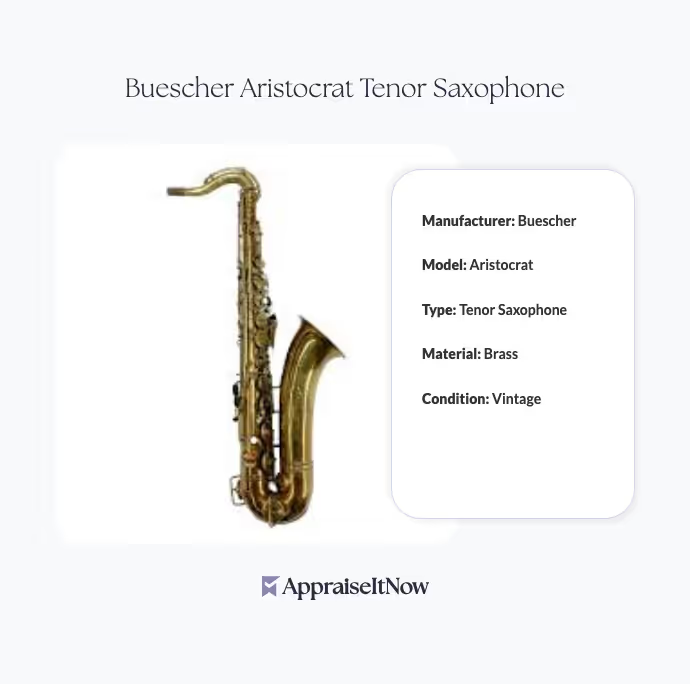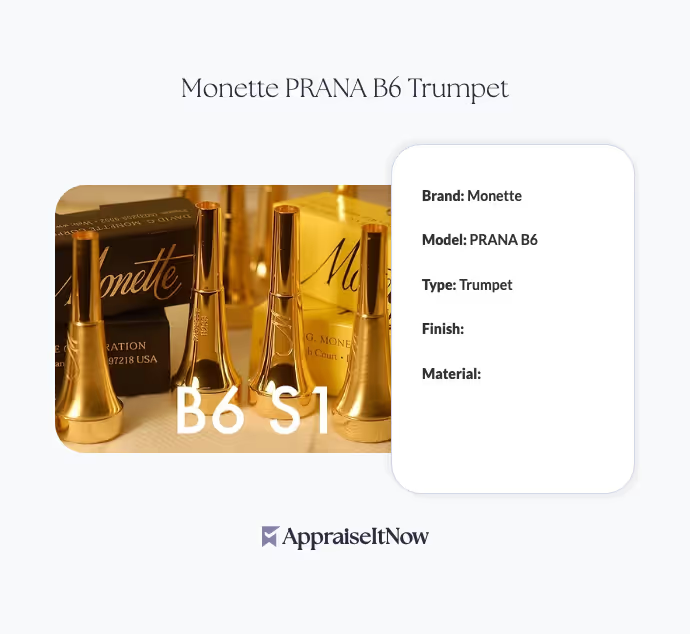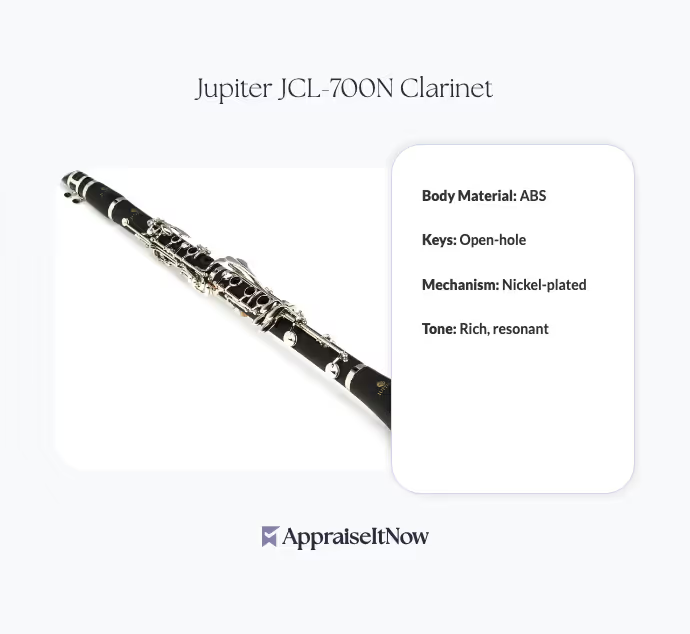<h1>How to Get Your Buescher Aristocrat Tenor Saxophone Appraised</h1>
<p>The Buescher Aristocrat Tenor Saxophone represents one of the most sought-after vintage instruments in today's musical marketplace. Whether you're considering selling an inherited family heirloom, insuring a professional musician's tool, or evaluating an acquisition, understanding how to properly appraise your Buescher Aristocrat requires knowledge of what drives its <strong>$3,000 to $5,000</strong> market value and where to find credentialed experts who can authenticate and value your instrument.</p>
<h2>Why the Buescher Aristocrat Commands Premium Values</h2>
<p>The Buescher Aristocrat Tenor Saxophone earned its reputation as a professional-grade instrument through exceptional construction quality and tonal characteristics that have attracted musicians and collectors for decades. First introduced in the 1940s, this saxophone features durable brass construction with a responsive keywork design that delivers the warm, rich sound professional musicians demand. When evaluating whether you should pursue an appraisal, understanding what makes Buescher saxophones special helps justify the investment in professional valuation services.</p>
<p>What sets the Aristocrat apart from other vintage saxophones? Buescher instruments were handcrafted during an era when manufacturing standards emphasized durability and playability over production volume. The company produced these instruments in limited quantities, making today's surviving examples increasingly rare and valuable. Unlike mass-produced modern saxophones, vintage Bueschers carry the hallmark of mid-century American craftsmanship that professional musicians and serious collectors actively seek.</p>
<div class="callout tip"><p><strong>Appraiser's Insight</strong></p>
<p>Buescher saxophones from the mid-20th century have appreciated significantly in recent years as collectors recognize their superior build quality and historical importance in American musical instrument manufacturing.</p></div>
<h2>Understanding Your Buescher Aristocrat's Key Value Drivers</h2>
<p>When a professional appraiser evaluates your tenor saxophone, they examine specific characteristics that directly influence its worth. The Aristocrat model specifically represents Buescher's commitment to playability, featuring a responsive keywork system that reduces air resistance and improves intonation—factors that musicians are willing to pay premium prices to obtain.</p>
<p>The serial number on your instrument tells a critical story about its age and production period. For Buescher saxophones, the serial number typically appears on the bell or lower tube section, and skilled appraisers use this information to date your instrument precisely. Knowing exactly when your Aristocrat was manufactured helps establish its historical significance and collectors' desirability, directly affecting its appraisal value.</p>
<p>Beyond basic identification, condition assessment forms the foundation of professional saxophone valuation. Your appraiser will examine the finish quality, checking for original lacquer versus refinishing, which can decrease value by 20-30% depending on the work's quality. They'll also assess the keywork's mechanical function, listening for proper regulation and checking for wear patterns that indicate playing history versus shelf storage.</p>
<h2>Finding the Right Appraiser for Your Saxophone</h2>
<p>Obtaining an accurate appraisal of your Buescher Aristocrat requires working with specialists who understand vintage instruments. Look for appraisers holding credentials from recognized organizations like the <strong>American Society of Appraisers (ASA)</strong>, <strong>International Society of Appraisers (ISA)</strong>, or <strong>American Association of Appraisers (AAA)</strong>. These professionals maintain rigorous standards and stay current with market conditions affecting <a href="/blog/appraising-musical-instruments-determining-the-worth-of-melodic-investments">musical instrument valuations</a>.</p>
<p>Professional appraisers specializing in musical instruments bring expertise that general appraisers simply cannot match. They understand the historical development of saxophone manufacturing, recognize construction variations that signal rarity, and stay informed about pricing trends in the <a href="/types/memorabilia-and-collectibles">memorabilia and collectibles</a> market. When evaluating appraisers, ask specifically about their experience with vintage saxophones and request references from previous clients.</p>
<div class="callout note"><p><strong>Selection Criteria</strong></p>
<p>The best appraisers maintain detailed knowledge of instrument-specific factors like manufacturer mark variations, common repair issues, and how vintage instruments compare to modern production standards.</p></div>
<h2>Documentation and Provenance: Building Your Appraisal File</h2>
<p>Before your appraiser evaluates your Buescher Aristocrat, assemble any documentation that establishes its history. Original cases, certificates of authenticity, receipts from previous purchases, or family records indicating when the saxophone was acquired all strengthen your appraisal. This documentation, called provenance, helps appraisers establish an instrument's path of ownership and use, which significantly impacts valuation.</p>
<p>Professional appraisals require comprehensive photographic documentation that captures every detail of your saxophone. High-quality images showing the entire instrument from multiple angles, close-ups of the serial number, maker's marks, and condition details become part of your permanent appraisal record. These photographs serve multiple purposes—insurance documentation, legal protection during sales, and reference material for future valuations when market conditions change.</p>
<h2>Comparing Your Buescher to Other Vintage Saxophones</h2>
<p>Many musicians and collectors wonder how a Buescher Aristocrat compares to other vintage instruments when considering purchase or sale. The question of whether Buescher saxophones rank among the finest ever made receives consistent affirmation from professional musicians who recognize the brand's commitment to quality. Comparing your Aristocrat's market position to instruments from competing manufacturers like Selmer, King, and Yanagisawa provides context for understanding its valuation range.</p>
<p>Are old saxophones worth anything? The answer depends entirely on maker and condition, which is why professional appraisal becomes essential. While some vintage saxophones hold minimal value due to excessive wear or inferior construction, quality instruments like the Buescher Aristocrat from the mid-twentieth century have appreciated significantly. Recent market analysis shows that well-maintained examples consistently sell within the $3,000-$5,000 range, though exceptional specimens with documented professional use or rare variations occasionally achieve higher prices.</p>
<h2>Current Market Conditions and Value Trends</h2>
<p>Your Buescher Aristocrat's value exists within a broader context of vintage instrument demand that has strengthened considerably over the past decade. Professional musicians increasingly recognize that vintage saxophones offer superior tonal qualities compared to many modern alternatives, driving collector interest and supporting stable pricing. When considering whether this is the right time to have your saxophone appraised for sale or insurance, current market conditions present favorable opportunities.</p>
<p>The vintage saxophone market shows particular strength for American-made instruments from the Buescher, Selmer, and King manufacturers. As fewer examples remain in playable condition due to age-related wear and deterioration, surviving instruments become progressively rarer. This scarcity, combined with strong demand from professional musicians seeking instruments with established tonal reputations, supports the current valuation range for well-maintained Aristocrat models.</p>
<h2>When to Seek Professional Appraisal Services</h2>
<p>Understanding when professional appraisal becomes necessary helps you make informed decisions about your Buescher Aristocrat. If you're considering selling your saxophone, whether through private sale, auction house, or music dealer, a certified appraisal establishes fair market value and protects both buyer and seller. For insurance purposes, lenders and insurance companies typically require professional appraisals for instruments valued above specific thresholds, ensuring you maintain adequate coverage for replacement or repair.</p>
<p>Estate planning represents another critical scenario where saxophone appraisal becomes essential. When transferring musical instruments through inheritance, executors need accurate valuations for tax and distribution purposes. Professional appraisals also prove invaluable during divorce settlements, business valuations where musical instruments factor into assets, or when donating instruments to educational institutions seeking tax deductions.</p>
<div class="callout tip"><p><strong>Timing Insight</strong></p>
<p>Market values for vintage instruments fluctuate based on collector demand, so appraisals typically remain valid for 3-5 years before requiring updates to reflect current conditions.</p></div>
<h2>The Appraisal Delivery and Documentation</h2>
<p>Once your appraiser completes their evaluation, you'll receive a detailed report documenting your Buescher Aristocrat's condition, historical significance, and current market value. Professional appraisal reports meeting <strong>USPAP standards</strong> (Uniform Standards of Professional Appraisal Practice) provide documentation that stands up to scrutiny from insurance companies, courts, and financial institutions. Your report becomes the authoritative record of your saxophone's worth at a specific point in time.</p>
<p>The comprehensive appraisal document includes detailed descriptions of your instrument's construction, manufacturing period, condition assessment, photographic documentation, and comparable sales analysis supporting the valuation. This level of detail distinguishes professional appraisals from casual price estimates or dealer quotes. Whether you need the appraisal for insurance, legal proceedings, or informational purposes, the documentation provides protection and clarity.</p>
<h2>Connecting with AppraiseItNow for Your Saxophone Appraisal</h2>
<p>Finding credentialed appraisers who specialize in vintage <a href="/types/personal-property">musical instruments</a> and <a href="/blog/assessing-the-value-of-musical-instruments-appraisals-of-vintage-guitars-pianos-and-violins">antique collectibles</a> has never been more accessible. <strong>AppraiseItNow</strong> connects you with certified professionals holding <strong>AAA, ISA, ASA, and CAGA credentials</strong> who understand the nuanced factors affecting Buescher Aristocrat valuations. Our network of experts provides fast, accurate appraisals delivered securely online, eliminating the need for in-person appointments while maintaining the highest professional standards.</p>
<p>The process is straightforward: submit photographs, descriptions, and any documentation about your saxophone through our secure platform, and our specialists will evaluate your instrument's condition and market position. You'll receive a comprehensive, USPAP-compliant appraisal report suitable for insurance, sale, or estate purposes within a timeframe that accommodates your needs.</p>
<div class="callout note"><p><strong>Key Takeaway</strong></p>
<p>A certified appraisal of your Buescher Aristocrat Tenor Saxophone provides essential documentation for accurate valuation, insurance coverage, and confident decision-making, whether you're buying, selling, or preserving this exceptional musical instrument for future generations.</p></div>
















